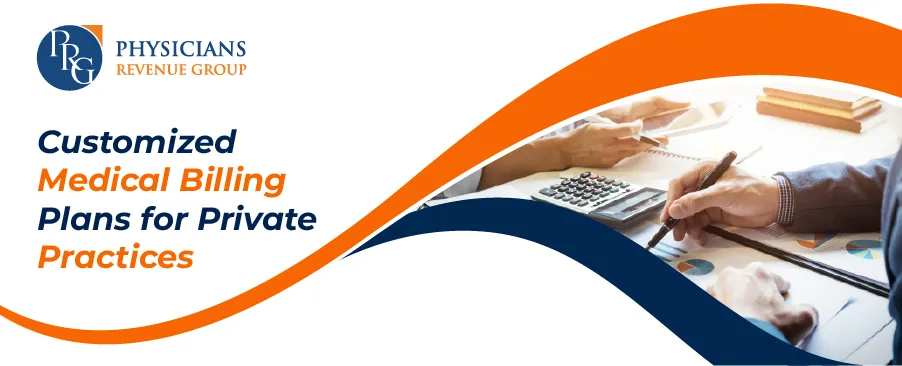
Email: info@prgmd.com | Call: +1 (630) 242-6474
Business hours: 9:00 to 5:00 | Monday to Friday
Email: info@prgmd.com | Call: +1 (630) 242-6474
Business hours: 9:00 to 5:00 | Monday to Friday

Table of Contents
ToggleAs an owner of a private practice, you clearly understand the importance of personalized medical billing plans. However, managing the entire RCM process, including the provider credentialing process, can become daunting. Credentialing in medical billing is critical to a practice’s financial management and thus necessitates knowledge/expertise and attention to detail. Outsourcing your entire RCM process can be a low-cost alternative, which lets you and your staff focus more on offering exceptional patient care.
Let’s explore customized patient medical billing plans – shedding light on tailored approaches to medical billing and enrollment in healthcare for providers.
Patient billing customization is adapting medical billing services to match healthcare practitioners’ specific and individual demands. A third-party billing company must recognize that every healthcare physician has a set of unique needs and requirements. Thus, providing personalized options helps improve efficiency and practice revenue. Patient billing personalization facilitates physicians’ ability to opt for services and medical billing plans that best meet their needs. It could range from full-service billing to specialized billing attributes/tasks, including claims submissions or payment posting.
Why do healthcare providers need customization?
Through customization of services, healthcare physicians can ensure that their RCM procedures are compliant (with proper provider credentialing), efficient, and precise. Professional billing companies like Physicians Revenue Group, Inc. collaborate directly with healthcare providers to create custom medical billing plans that suit their specific needs and maximize practice revenue.
Medical billing is intricate owing to varying requirements linked to different specialties, insurance providers, and local/federal regulations. Standard billing solutions are not sufficient to address the needs of private practices. It is where custom medical billing plans come into play; such plans from professional third-party billing companies are customized to fit a practice’s spatiality, size, needs, patient volume, and reimbursement processes. Professional billing partners ensure that all claims are submitted accurately, denials are reduced, and reimbursements are processed faster.
Below is how customized medical billing plans can be tailored to the needs of private medical practices:
Credentialing in medical billing is a process of confirming a healthcare provider’s experience, training, education, and competence to ensure they meet all patient care requirements. The main goal of proper enrollment in healthcare is to ensure that all healthcare workers are certified to offer top-quality care and lower malpractice risks.
All medical providers must register with Medicare and have an NPI (National Provider Identifier) number to participate in the Medicare program. For enrolling, all healthcare providers must complete an application that details their education, training, and experience. Furthermore, to participate in a Medicaid program, medical providers must register with their state Medicaid agency and verify their credentials.
The credentialing software is expensive, which makes it out of reach for many smaller practices. While the software is limited to tracking features, most users still complain that the software is complex to figure out. Most users also fail to set it up correctly and miss the re-credentialing widow.
Some billing provider companies offer credentialing as an add-on, but credentialing might not be their primary business. They might also not have the in-house expertise of a dedicated credentialing provider.
On the other hand, a specialized credentialing service focuses entirely on credentialing – like the Physicians Revenue Group, Inc. Our employees are experts and give providers tools to streamline their submission processes. Documentation is stored in the secure, HIPAA-compliant data repository. It works alongside all payers in all states of the USA, with experience with all specialties.
Share:
Categories
Recently Added

What is an ABN in medical billing?

What does a Clearinghouse do During Claims Submission?

What is EOR in Medical Billing?
We Would Love to Assist You!
We treat your data confidentially and don’t share any information with a third party.